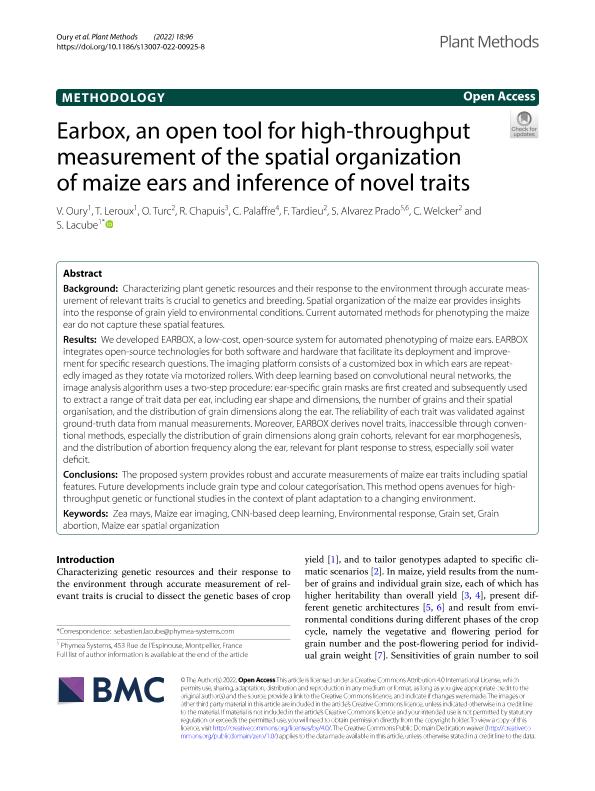Mostrar el registro sencillo del ítem
dc.contributor.author
Oury, V.
dc.contributor.author
Leroux, T.
dc.contributor.author
Turc, O.
dc.contributor.author
Chapuis, R.
dc.contributor.author
Palaffre, C.
dc.contributor.author
Tardieu, F.
dc.contributor.author
Alvarez Prado, Santiago

dc.contributor.author
Welcker, C.
dc.contributor.author
Lacube, S.
dc.date.available
2023-09-28T14:35:14Z
dc.date.issued
2022-12
dc.identifier.citation
Oury, V.; Leroux, T.; Turc, O.; Chapuis, R.; Palaffre, C.; et al.; Earbox, an open tool for high-throughput measurement of the spatial organization of maize ears and inference of novel traits; BioMed Central; Plant Methods; 18; 1; 12-2022; 1-17
dc.identifier.issn
1746-4811
dc.identifier.uri
http://hdl.handle.net/11336/213446
dc.description.abstract
Background: Characterizing plant genetic resources and their response to the environment through accurate measurement of relevant traits is crucial to genetics and breeding. Spatial organization of the maize ear provides insights into the response of grain yield to environmental conditions. Current automated methods for phenotyping the maize ear do not capture these spatial features. Results: We developed EARBOX, a low-cost, open-source system for automated phenotyping of maize ears. EARBOX integrates open-source technologies for both software and hardware that facilitate its deployment and improvement for specific research questions. The imaging platform consists of a customized box in which ears are repeatedly imaged as they rotate via motorized rollers. With deep learning based on convolutional neural networks, the image analysis algorithm uses a two-step procedure: ear-specific grain masks are first created and subsequently used to extract a range of trait data per ear, including ear shape and dimensions, the number of grains and their spatial organisation, and the distribution of grain dimensions along the ear. The reliability of each trait was validated against ground-truth data from manual measurements. Moreover, EARBOX derives novel traits, inaccessible through conventional methods, especially the distribution of grain dimensions along grain cohorts, relevant for ear morphogenesis, and the distribution of abortion frequency along the ear, relevant for plant response to stress, especially soil water deficit. Conclusions: The proposed system provides robust and accurate measurements of maize ear traits including spatial features. Future developments include grain type and colour categorisation. This method opens avenues for high-throughput genetic or functional studies in the context of plant adaptation to a changing environment.
dc.format
application/pdf
dc.language.iso
eng
dc.publisher
BioMed Central

dc.rights
info:eu-repo/semantics/openAccess
dc.rights.uri
https://creativecommons.org/licenses/by-nc-sa/2.5/ar/
dc.subject
CNN-BASED DEEP LEARNING
dc.subject
ENVIRONMENTAL RESPONSE
dc.subject
GRAIN ABORTION
dc.subject
GRAIN SET
dc.subject
MAIZE EAR IMAGING
dc.subject
MAIZE EAR SPATIAL ORGANIZATION
dc.subject
ZEA MAYS
dc.subject.classification
Agricultura

dc.subject.classification
Agricultura, Silvicultura y Pesca

dc.subject.classification
CIENCIAS AGRÍCOLAS

dc.title
Earbox, an open tool for high-throughput measurement of the spatial organization of maize ears and inference of novel traits
dc.type
info:eu-repo/semantics/article
dc.type
info:ar-repo/semantics/artículo
dc.type
info:eu-repo/semantics/publishedVersion
dc.date.updated
2023-07-07T20:11:14Z
dc.journal.volume
18
dc.journal.number
1
dc.journal.pagination
1-17
dc.journal.pais
Reino Unido

dc.journal.ciudad
Londres
dc.description.fil
Fil: Oury, V.. No especifíca;
dc.description.fil
Fil: Leroux, T.. No especifíca;
dc.description.fil
Fil: Turc, O.. Université Montpellier II; Francia
dc.description.fil
Fil: Chapuis, R.. Université Montpellier II; Francia
dc.description.fil
Fil: Palaffre, C.. Universite de Bordeaux; Francia
dc.description.fil
Fil: Tardieu, F.. Université Montpellier II; Francia
dc.description.fil
Fil: Alvarez Prado, Santiago. Consejo Nacional de Investigaciones Científicas y Técnicas. Oficina de Coordinación Administrativa Parque Centenario. Instituto de Investigaciones Fisiológicas y Ecológicas Vinculadas a la Agricultura. Universidad de Buenos Aires. Facultad de Agronomía. Instituto de Investigaciones Fisiológicas y Ecológicas Vinculadas a la Agricultura; Argentina
dc.description.fil
Fil: Welcker, C.. Université Montpellier II; Francia
dc.description.fil
Fil: Lacube, S.. No especifíca;
dc.journal.title
Plant Methods

dc.relation.alternativeid
info:eu-repo/semantics/altIdentifier/doi/http://dx.doi.org/10.1186/s13007-022-00925-8
Archivos asociados
